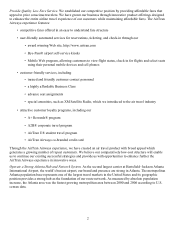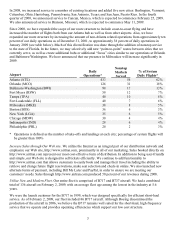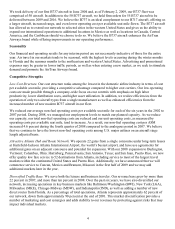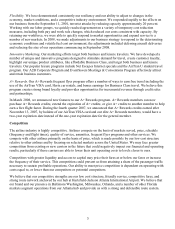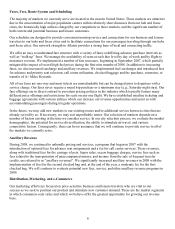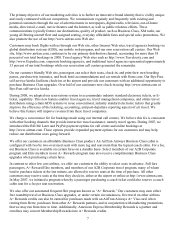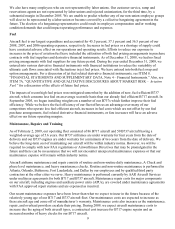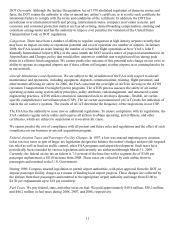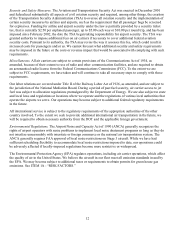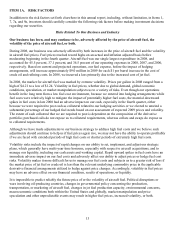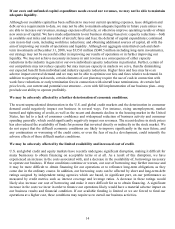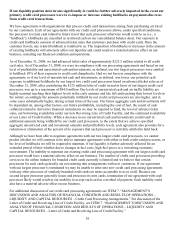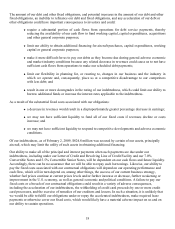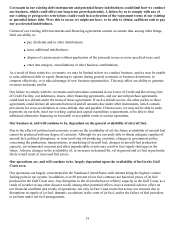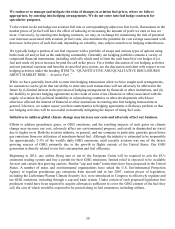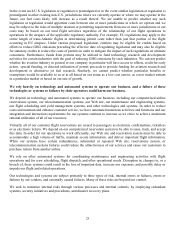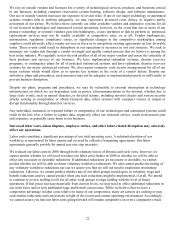Airtran 2008 Annual Report Download - page 20
Download and view the complete annual report
Please find page 20 of the 2008 Airtran annual report below. You can navigate through the pages in the report by either clicking on the pages listed below, or by using the keyword search tool below to find specific information within the annual report.Security and Safety Measures. The Aviation and Transportation Security Act was enacted in December 2001
and federalized substantially all aspects of civil aviation security and required, among other things, the creation
of the Transportation Security Administration (TSA) to oversee all aviation security and the implementation of
certain security measures by airlines and airports, such as the requirement that all passenger bags be screened
for explosives. Funding for airline and airport security under the law is partially provided by a security ticket
tax, that is currently $2.50 per enplaned passenger, up to $5.00 each way or $10.00 per round trip, and has been
imposed since February 2002, the date the TSA began taking responsibility for airport security. The TSA was
granted authority to impose additional fees on air carriers if necessary to cover additional federal aviation
security costs. Pursuant to its authority, the TSA may revise the way it assesses this fee, which could result in
increased costs for passengers and/or us. We cannot forecast what additional security and safety requirements
may be imposed in the future or the costs or revenue impact that would be associated with complying with such
requirements.
Miscellaneous. All air carriers are subject to certain provisions of the Communications Act of 1934, as
amended, because of their extensive use of radio and other communication facilities, and are required to obtain
an aeronautical radio license from the Federal Communications Commission (FCC). To the extent we are
subject to FCC requirements, we have taken and will continue to take all necessary steps to comply with those
requirements.
Our labor relations are covered under Title II of the Railway Labor Act of 1926, as amended, and are subject to
the jurisdiction of the National Mediation Board. During a period of past fuel scarcity, air carrier access to jet
fuel was subject to allocation regulations promulgated by the Department of Energy. We are also subject to state
and local laws and regulations at locations where we operate and the regulations of various local authorities that
operate the airports we serve. Our operations may become subject to additional federal regulatory requirements
in the future.
All international service is subject to the regulatory requirements of the appropriate authorities of the other
country involved. To the extent we seek to provide additional international air transportation in the future, we
will be required to obtain necessary authority from the DOT and the applicable foreign government.
Environmental Regulations. The Airport Noise and Capacity Act of 1990 (ANCA) generally recognizes the
rights of airport operators with noise problems to implement local noise abatement programs so long as they do
not interfere unreasonably with interstate or foreign commerce or the national air transportation system. The
ANCA generally requires FAA approval of local noise restrictions on Stage 3 aircraft. While we have had
sufficient scheduling flexibility to accommodate local noise restrictions imposed to date, our operations could
be adversely affected if locally-imposed regulations become more restrictive or widespread.
The Environmental Protection Agency (EPA) regulates operations, including air carrier operations, which affect
the quality of air in the United States. We believe the aircraft in our fleet meet all emission standards issued by
the EPA. We may become subject to additional taxes or requirements to obtain permits for green house gas
emissions. See ITEM 1A - “RISK FACTORS.”
12


